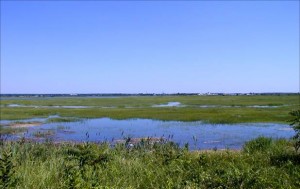September 21st, 2009 by Frank LaBanca, Ed.D.

from the town of Stratford
I often think back to Ralph Yulo’s important statement “Put your questions to nature,” when I engage students in field experiences. Last Thursday, I took my graduate science methods students to Great Meadows Marsh in Stratford. This has long been a favorite site for me because it is such a powerful example of the beauty and grandeur of nature and the impact of human activity.
Great Meadows sits on Long Island Sound to the south (Long Beach) and is surrounded by the Sikorsky Airport, Bridgeport to the west, and Lordship to the east. The drive into the area takes you right through the middle of the marsh, and you immediately gain a sense of the vastness of the area in comparison to the extensive development that surrounds it.
What I like best about the marsh is the enormity of the topics that can be discussed. I bring several activities for students to complete including:
- water chemistry (dissolved oxygen, pH, temperature, salinity, etc.)
- bait fishing (using small minnow traps)
- finding interesting things.
I’ve described a meaningful marsh experience in a paper written for the Connecticut Journal of Science Education here.
What I always find to be the most powerful part of the experience, however, is the discussions that ensue. I love to talk about edible marsh plants and often offer a sample of rose hip jelly, a taste of beach rose flowers or glasswort. Jumping on an area of marsh always provides a powerful example of how absorbent and sponge-like the area is. And the cautious eye of the student (or me) can often finding interesting science concepts embedded in the sand or the mud.
I think the real power in a successful trip stems from creating an environment that is conducive to questioning. That’s where real inquiry IS! I can provide structured activities for the students, but I think the real learning comes from their enthusiasm and excitement from wanting to learn something new about the world. Those questions (both from them and me) are the intangibles of good teaching and learning.
In essence, what’s not planned is as important as what IS planned. Sure there’s a bit of finese and experience required, but I think the end results are so powerful.